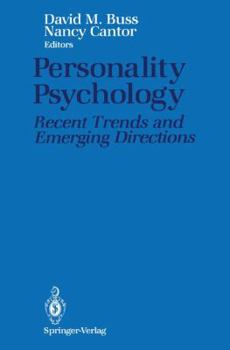Personality Psychology: Recent Trends and Emerging Directions
Select Format
Select Condition 
Book Overview
Research in the field of personality psychology has culminated in a radical departure. The result is Personality Psychology: Recent Trends and Emerging Directions . Drs. Buss and Cantor have compiled the innovative research of twenty-five young, outstanding personality psychologists to represent the recent expansion of issues in the fields. Advances in assessment have brought about more powerful methods and the explanatory tools for extending personality...
Format:Paperback
Language:English
ISBN:1468406361
ISBN13:9781468406368
Release Date:July 2013
Publisher:Springer
Length:358 Pages
Weight:1.15 lbs.
Dimensions:0.8" x 6.1" x 9.2"
Customer Reviews
5 ratings
Awesome service!
Published by Thriftbooks.com User , 15 years ago
This product was in great condition and it arrived super fast! I love fast service and this definitely was a huge plus! I'd highly recommend!!!
personality psychology
Published by Thriftbooks.com User , 15 years ago
I was very happy receiving the item on time and it just as new as it was mentioned. Thank you
oddly incoherent
Published by Thriftbooks.com User , 16 years ago
I'm of two minds about this book. My girlfriend is reading it at the moment for an intro psych course, and there seems to be little to no checking going on when it comes to creating a unified narrative. There are multiple instances where multiple pages of text are devoted to a single phenomenon/finding, followed by the question "might it be the case that ", as if they weren't just explaining just that they had found this.. This (lack of?) redaction tends to make me suspicious of the content presented. ie. on page 476-482, concerning 'Self-esteem variability', the book references a 1994 study by Butler/Hokanson/Flynn about 'Self-Esteem Lability', stating the study found that the daily variation in self-esteem levels found was random, rather than explaining they were talking about "daily event-related variability in state self-esteem" (study abstract, effectively: people can indeed become offended when insulted and/or happy when complimented), and concluding the paragraph stating that people who were more vulnerable to criticism/social valuation are more prone to become depressed. On the whole, the book does discuss a lot of different theories/research findings, which one might consider a pro, but the flip-side of that is that they give nearly no textual clues as to which findings they consider more relevant or which are generally accepted, and which aren't (yet). The amount of studies referenced varies wildly, (sometimes 1 study, sometimes 30+) but they never bother saying why they feel findings supported by single studies should still be considered important, relevant, or interesting, nearly always phrasing sentences using "might be the case"
Great Book!
Published by Thriftbooks.com User , 17 years ago
This book is probably one of the best textbooks that I have encountered in my study of psychology. Buss/Larsen put this book together very well and included all the important facts on personality. I really enjoyed the different self tests that were included.
Good Introductory Text on Personality from Research View
Published by Thriftbooks.com User , 21 years ago
I have recently completed teaching an undergraduate course on Theories of Personality using this text. It is well written and very usable for an introductory course in personality theory. It's biggest strength is also it's biggest weakness in my opinion. The text presents personality theory from the perspective of current psychological research. Thus, it provides students with a wealth of research in the realm of personality from six domains: biological, intrapsychic, cognitive/experiential, dispositional, cultural, and adjustment. This is the text's strength. Because of this format, however, it basically plays out as a survey course of the research associated with personality theory. In my opinion, it minimally addresses the grand theories of personality. The authors contend that this is because the research has not substantiated these theories. Yet, from a clinical perspective I would argue that there is merit with having students wrestle with many of the concepts and ideas associated with those theories. That will not happen in this book. Nevertheless, the book does a good job of reviewing research in areas that would probably not be addressed in traditional theories of personality courses. Kevin Dugan, Ph.D.






